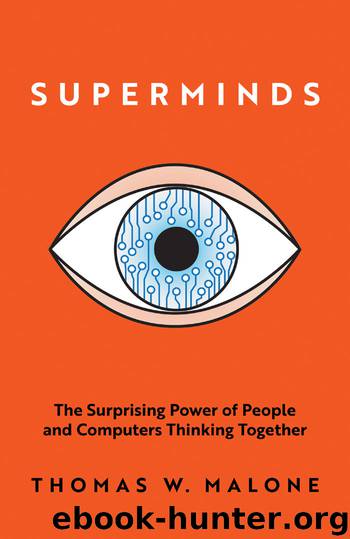Superminds: The Surprising Power of People and Computers Thinking Together by Thomas W. Malone

Author:Thomas W. Malone [Malone, Thomas W.]
Language: eng
Format: epub
Publisher: Oneworld Publications
Published: 2018-07-04T23:00:00+00:00
It’s clear from the diagram that the global proposals (top row) included many different combinations of national and regional proposals (middle rows), which in turn included many different combinations of basic proposals (bottom rows). It’s also clear that proposal authors reused work done by others as well as their own. In other words, many different people were simultaneously exploring many different combinations of the ideas represented in different proposals.
Incentives for Collaboration
Contest webs raise one more important question: Why would people create proposals that can be effectively combined with other proposals? Why would they, for example, try to make their national plan for India be compatible with national plans for other countries so they could fit together in a single global plan?
The similarity between contest webs and supply webs for physical products suggests an obvious answer to these questions: the creators of integrated proposals can “pay” the creators of the other entries they use, which motivates groups to create proposals that others want to use. To implement this idea in Climate CoLab, we created an artificial currency called CoLab points, which eventually get converted to dollars (in 2015, members received two dollars for every CoLab point), and we created an automatic pricing scheme to distribute these points.
Here’s how it works: The judges in the global contest represent the “end customers” of the whole problem-solving system. They “buy” the global proposals they think are best for the prices, or points, they think they are worth. Then the points each global proposal receives are distributed automatically among the authors of the global proposal itself and the authors of all the national and other lower-level proposals it incorporates. The rules for distributing the points are designed to give the biggest rewards to people who created the parts of the overall proposal that require the most work and are most important to the overall problem.15
At each contest level, these rules motivate people not only to compete with the creators of other proposals in the contests they enter but also to cooperate with the creators of proposals in higher- and lower-level contests.
For instance, one winning global proposal focused on ways to mobilize citizens and organizations of many different sizes to combat climate change. This proposal brought together a team that eventually included more than 25 authors, many of whom had created lower-level proposals themselves and many of whom did not know each other before “meeting” on the Climate CoLab site. This team didn’t just collaborate to create a global proposal: when we last talked to the members, they were also actively working together to raise money to implement the ideas in their proposals.
Download
This site does not store any files on its server. We only index and link to content provided by other sites. Please contact the content providers to delete copyright contents if any and email us, we'll remove relevant links or contents immediately.
Nudge - Improving Decisions about Health, Wealth, and Happiness by Thaler Sunstein(7689)
Deep Work by Cal Newport(7063)
Principles: Life and Work by Ray Dalio(6416)
The Doodle Revolution by Sunni Brown(4752)
Factfulness: Ten Reasons We're Wrong About the World – and Why Things Are Better Than You Think by Hans Rosling(4731)
Eat That Frog! by Brian Tracy(4524)
Thinking in Bets by Annie Duke(4218)
Hyperfocus by Chris Bailey(4110)
Visual Intelligence by Amy E. Herman(3775)
Writing Your Dissertation in Fifteen Minutes a Day by Joan Bolker(3721)
Ogilvy on Advertising by David Ogilvy(3603)
Hidden Persuasion: 33 psychological influence techniques in advertising by Marc Andrews & Matthijs van Leeuwen & Rick van Baaren(3551)
How to Win Friends and Influence People in the Digital Age by Dale Carnegie & Associates(3544)
How to win friends and influence people by Dale Carnegie(3468)
The Pixar Touch by David A. Price(3430)
Schaum's Quick Guide to Writing Great Short Stories by Margaret Lucke(3371)
Deep Work: Rules for Focused Success in a Distracted World by Cal Newport(3224)
Work Clean by Dan Charnas(3114)
The Slow Fix: Solve Problems, Work Smarter, and Live Better In a World Addicted to Speed by Carl Honore(3001)
